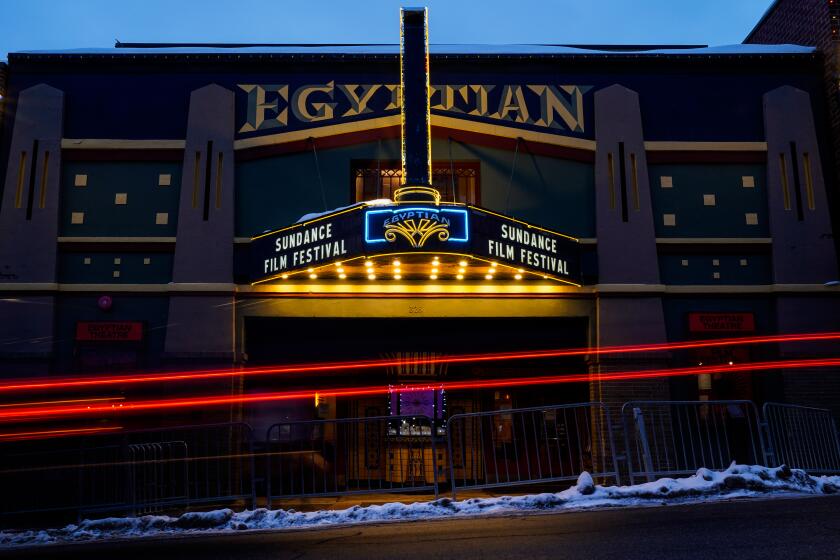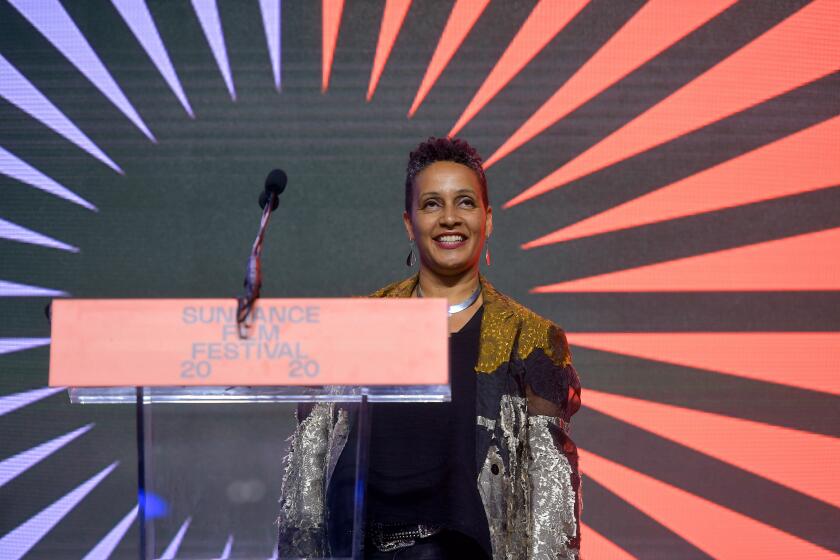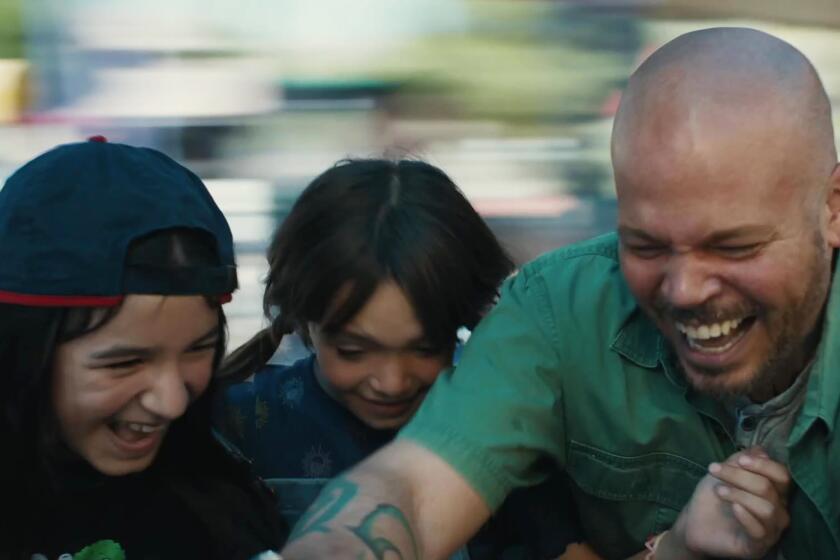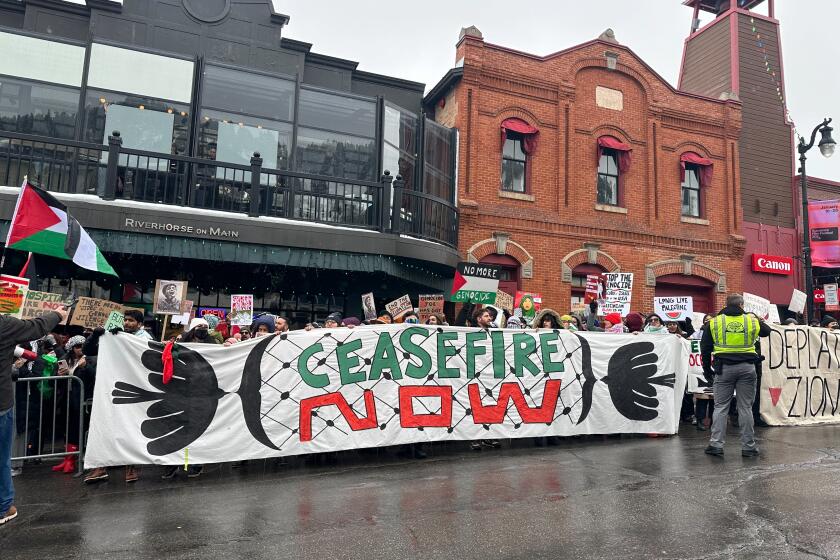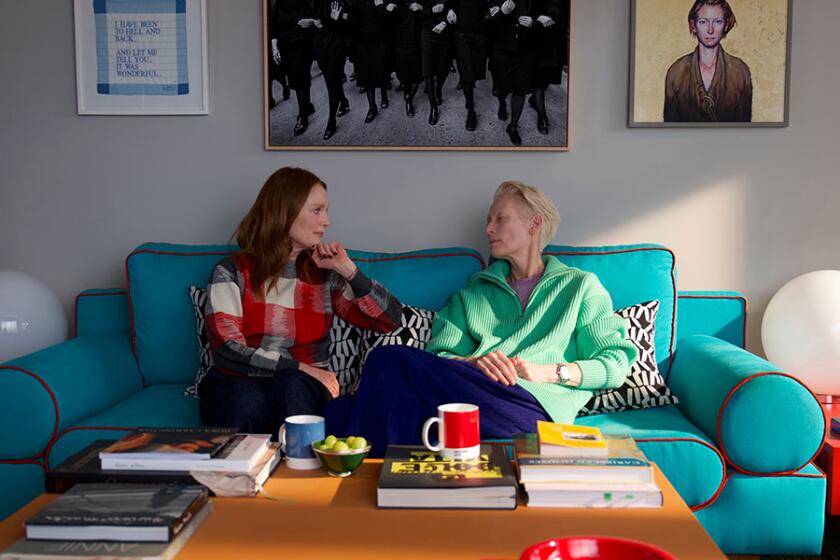‘Minari’ wins top awards at the Sundance Film Festival, as women sweep directing prizes
- Share via
PARK CITY, Utah — Lee Isaac Chung’s breakout film “Minari” inspired such strong audience devotion at the 2020 edition of the Sundance Film Festival that when it won the top U.S. Dramatic grand jury prize Saturday night in Park City, it was hardly surprising to see the room erupt in cheers.
The autobiographical film, based on Chung’s own childhood on a rural Arkansas farm, follows a Korean American family as they struggle to establish roots in a foreboding new place. Steven Yeun, Yeri Han, Alan Kim, Noel Kate Cho, Will Patton and Yuh-Jung Youn star in the moving drama, which A24 will release theatrically later this year.
Earlier in the night, “Minari” won its first honor: the Audience Award. “We’re a long way from the Ozarks from that trailer home,” Chung said, sending a message to his sister.
“Minari” became only the eighth film to win both the grand jury prize and audience award in the U.S. dramatic competition, considered the festival’s top prizes, since the audience award was introduced in 1989. (Among the other titles to claim both prizes are the Oscar nominated “Whiplash” and “Precious.”)
The top U.S. Documentary prize also went to a title that had drawn strong support throughout the festival: “Boys State,” the chronicle of a weeklong boys’ leadership camp in Texas from directors Jesse Moss and Amanda McBaine. The film inked a documentary record-breaking $12 million distribution deal with Apple and A24 midway through the festival. That gave A24, arguably the hottest indie distributor in the business, the top two jury prize winners.
The audience award for U.S. documentary went to Netflix’s “Crip Camp,” directed by Nicole Newnham and Jim Lebrecht. In accepting the award, Lebrecht described the film as a love letter to the disabled community, saying “I’m so proud to be up here and proud to be part of this community I love so much.”
This year’s 28 prizes were awarded to 25 films from filmmakers representing a wide range of nationalities and backgrounds. Twelve (48%) of the winning films were directed by at least one woman, ten (40%) were directed by one or more people of color, and two (8%) were directed by a filmmaker identifying as LGTBQ+.
All four of the jury directing prizes went to female filmmakers: Garrett Bradley’s “Time” in U.S. Documentary, Radha Blank’s Netflix acquisition “The 40-Year-Old Version” in U.S. Dramatic, Iryna Tsilyk’s “The Earth is Blue as an Orange” from Ukraine/Lithuania in World Documentary and Maïmouna Doucouré’s “Cuties” (another Netflix title) from France in World Dramatic.
The Los Angeles Times staff picks their favorite films from Sundance 2020, where indie gems and bold voices premiered new films.
“Sundance was founded on the idea that art can not only entertain, it can convince, discredit, agitate and empower,” said Keri Putnam, director of the Sundance Institute, in her opening remarks. “In volatile times like these, democracy and storytelling aren’t separate, they’re inextricably linked.”
Both the audience award and the jury award for the Next section — “marked by pure, bold works that are distinguished by an innovative, forward-thinking approach to storytelling” — went to the Spanish language love story “I Carry You With Me,” the first fiction feature made by veteran documentary filmmaker Heidi Ewing. It was acquired by Sony Pictures Classics during the festival.
“This story is about love, it’s about love without borders, it’s about seeing people for who they are instead of some monolithic group,” she said of the U.S.-Mexico co-production, accepting her second award in English and Spanish. “We should be co-producing, co-living, talking to each other,” she said. “We did it together.”
During the ceremony it was announced that Tabitha Jackson would be taking over as festival director from John Cooper, who has led the event since 2009. Jackson has been director of the documentary program at the Sundance Institute since 2013. In making the announcement, Putnam said, “we found the leader we most need for the next era of Sundance Film Festival is actually already a member of our family.”
As noted by jury member Ethan Hawke, this year’s U.S. dramatic competition was one of the most fiercely competitive in recent memory. Several titles in the section were among the festival’s most high-profile and widely discussed films, including “Minari,” the black-and-white comedy “The 40-Year-Old-Version,” Focus Features’ abortion drama “Never Rarely Sometimes Always,” unconventional bio-pic “Shirley,” starring Elisabeth Moss, and A24’s Twitter-inspired road trip saga “Zola.” The competition title “Palm Springs,” a romantic comedy with a twist starring Andy Samberg and Cristin Milioti, set a new record for a Sundance sale, going to Neon and Hulu for $17.5 million and 69 cents.
Huge applause met first-time filmmaker Blank as she was awarded the U.S. Dramatic directing award for “The 40-Year-Old Version,” a semiautobiographical New York-set story she wrote, directed and stars in about a frustrated playwright who finds a new outlet in hip-hop.
In presenting the award, jury member Dee Rees placed Blank in the company of Orson Welles, Spike Lee and Charlie Chaplin as someone able to write, direct and star in their very first film.
“To anybody who felt there’s an expiration on a passion … if it’s in you to be a rapper, a parent, a director in your 40s, do that,” said Blank.
“Shirley” director Josephine Decker landed a special jury prize for auteur filmmaking, while special jury prizes also went to the ensemble cast of “Charm City Kings” and Eliza Hittman’s “Never Rarely Sometimes Always” for “neorealism.” The Waldo Salt screenwriting award went to Edson Oda for “Nine Days.”
Accepting her special jury prize for innovative storytelling in the U.S. Documentary competition, Kirsten Johnson, director of Netflix’s “Dick Johnson is Dead,” said, “It’s just been so moving tonight to see who has come up on this stage that didn’t use to come up on this stage.”
Johnson also noted that she is married to incoming festival director Jackson, “this woman who I am willing to share with you all.”
Directors Emerald Fennell, Julie Taymor, Josephine Decker and Radha Blank all brought new work to the Sundance Film Festival.
The prizes in the world cinema categories went to films from a wide variety of countries, including the United Kingdom, Kenya, France, Romania, Norway, Ukraine, Cuba, Iran, Mexico and Lesotho.
In the world cinema documentary competition, the grand jury prize went to Hubert Sauper’s Cuba-set “Epicentro” from Austria, France and the United States, while the audience award went to the U.K.’s “The Reason I Jump,” directed by Jerry Rothwell.
Fernanda Valadez’s “Identifying Features” from Mexico and Spain, which was acquired by Kino Lorber, won the world cinema dramatic audience award and also claimed a screenplay prize from the jury.
The world cinema dramatic grand jury prize went to Massoud Bakhshi for “Yalda, A Night for Forgiveness.” In a video, Bakhshi said, “I strongly believe we can change this world for the better if only we believe in our shared humanity. And that’s what I believe Sundance is about.”
A full list of winners follows.
U.S. Dramatic Jury Awards
(Jury: director Rodrigo Garcia, actor Ethan Hawke, filmmaker Dee Rees, actress Isabella Rossellini and director Wash Westmoreland)
Grand Jury Prize: “Minari,” directed by Lee Isaac Chung
Jury Award for Directing: Radha Blank, “The 40-Year-Old Version”
Waldo Salt Screenwriting Award: Edson Oda, “Nine Days”
Special Jury Award for Neorealism: Eliza Hittman, “Never Rarely Sometimes Always”
Special Jury Award for Auteur Filmmaking: Josephine Decker, “Shirley”
Special Jury Award for Ensemble Cast: “Charm City Kings”
U.S. Documentary Jury Awards
(Jury: director Kimberly Reed, SFFILM director of programming Rachel Rosen, CNN Films senior vice president Courtney Sexton, director E. Chai Vasarhelyi and ITVS vice president of content Noland Walker)
Grand Jury Prize: “Boys State,” directed by Jesse Moss
Jury Award for Directing: Garrett Bradley, “Time”
Special Jury Award for Innovation in Nonfiction Storytelling: Kirsten Johnson, “Dick Johnson Is Dead”
Special Jury Award for Editing: Tyler H. Walk, “Welcome To Chechnya”
Special Jury Award for Social Impact Filmmaking: Elyse Steinberg, Josh Kriegman, and Eli Despres, “The Fight”
Special Jury Award for Emerging Filmmaker: Arthur Jones, “Feels Good Man”
From “Zola” lead Taylour Paige to “Minari” scene-stealer Alan Kim, all the fresh faces who made big impressions at the 2020 Sundance Film Festival.
World Cinema Dramatic Jury Awards
(Jury: director Haifaa Al Mansour, actor Wagner Moura and actress Alba Rohrwacher)
Grand Jury Prize: “Yalda, A Night for Forgiveness,” directed by Massoud Bakhsh (Iran/France/Germany/Switzerland/Luxembourg)
Jury Award for Directing: Maïmouna Doucouré, “Cuties” (France)
Special Jury Award for Best Screenplay: Fernanda Valadez and Astrid Rondero, “Identifying Features (Sin Señas Particulares)” (Mexico/Spain)
Special Jury Award for Visionary Filmmaking: Lemohang Jeremiah Mosese, “This Is Not a Burial, It’s a Resurrection” (Lesotho/South Africa/Italy)
Special Jury Award for Acting: Ben Whishaw, “Surge” (U.K.)
World Cinema Documentary Jury Awards
(Jury: Museum of the Moving Image film curator Eric Hynes, Arab Fund for Arts and Culture executive director Rima Mismar and filmmaker Nanfu Wang)
Grand Jury Prize: “Epicentro,” directed by Hubert Sauper (Austria/France/U.S.A.)
Jury Award for Directing: Iryna Tsilyk, “The Earth Is Blue as an Orange” (Ukraine/Lithuania)
Special Jury Award for Creative Storytelling: Benjamin Ree, “The Painter and the Thief” (Norway)
Special Jury Award for Cinematography: Mircea Topoleanu and Radu Ciorniciuc, “Acasa, My Home” (Romania/Germany/Finland)
Special Jury Award for Editing: Mila Aung-Thwin, Sam Soko, and Ryan Mullins, “Softie” (Kenya)
Next Innovator Award
(Filmmaker Gregg Araki is the one-person jury)
“I Carry You With Me,” directed by Heidi Ewing (U.S.A./Mexico)
Audience Awards
U.S. Dramatic: “Minari,” directed by Lee Isaac Chung (U.S.A.)
U.S. Documentary: “Crip Camp,” directed by Nicole Newnham and Jim LeBrecht (U.S.A.)
World Cinema Dramatic: “Identifying Features (Sin Señas Particulares),” directed by Fernanda Valadez (Mexico/Spain)
World Cinema Documentary: “The Reason I Jump,” directed by Jerry Rothwell (U.K.)
Next: “I Carry You With Me,” directed by Heidi Ewing (U.S.A./Mexico)
Tabitha Jackson, currently director of the documentary program at the Sundance Institute, will take over from John Cooper as the Sundance Institute approaches its 40th anniversary.
Alfred P. Sloan Feature Film Prize
(Presented to an outstanding feature film focusing on science or technology as a theme, or depicting a scientist, engineer or mathematician as a major character.)
(Jury: American Museum of Natural History assistant curator Dr. Ruth Angus, actress Emily Mortimer, filmmaker and visual artist Jessica Oreck, scientist Ainissa Ramirez and filmmaker Michael Tyburski)
“Tesla,” directed by Michael Almereyda (U.S.A.)
Short Film Jury Awards
(Jury: actress Sian Clifford, Strand Releasing co-president and co-founder Marcus Hu and artist Cindy Sherman)
Grand Jury Prize: Sofia Alaoui, “So What If The Goats Die” (France, Morocco)
Jury Award for U.S. Fiction: Terrance Daye, “-Ship: A Visual Poem” (U.S.A.)
Jury Award for International Fiction: Dylan Holmes Williams, “The Devil’s Harmony” (United Kingdom)
Jury Award for Non-fiction: Matthew Killip, “John Was Trying to Contact Aliens” (U.S.A.)
Jury Award for Animation: Daria Kashcheeva, “Daughter” (Czech Republic)
Special Jury Award for Acting: Sadaf Asgari, “Exam” (Iran)
Special Jury Award for Directing: Michael Arcos, “Valerio’s Day Out” (Colombia, U.S.A.)
Sundance Institute / Amazon Studios Producers Awards
Documentary Features: Diane Becker and Melanie Miller of Fishbowl Films, “Whirlybird” (U.S.A.)
Narrative Features: Huriyyah Muhammad, “Farewell Amor” (U.S.A.)
More to Read
Only good movies
Get the Indie Focus newsletter, Mark Olsen's weekly guide to the world of cinema.
You may occasionally receive promotional content from the Los Angeles Times.
